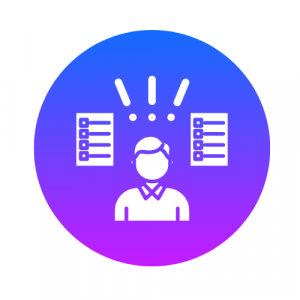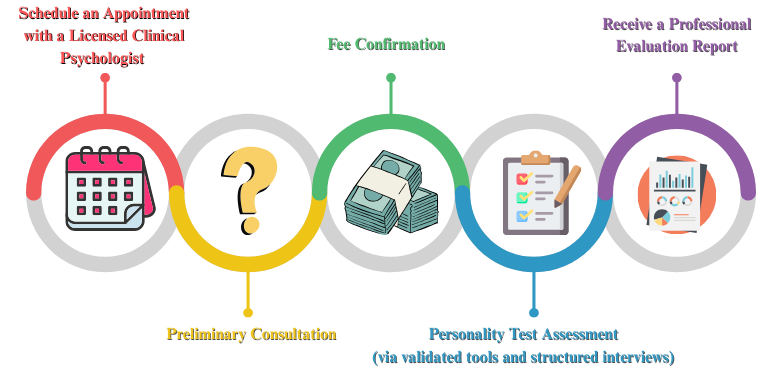13-9, 2 Rio Tower, Persiaran Rio, Bandar Puteri, 47100 Puchong, Selangor, Malaysia.
Cluster C: Personality Disorders
Personality Trait Assessment
(Anxious or Fearful Patterns)
Many people search for a Personality Test Assessment
to understand their personality patterns. In clinical psychology, Cluster C traits are often described as the “anxious or fearful” group—marked by sensitivity, worry, and a strong need for security in relationships and daily life.
These traits can bring diligence, empathy, and responsibility, but when intense, may cause distress, avoidance, or dependency. Recognising them early helps individuals balance strengths with healthier coping strategies.
Confidential • Licensed Psychologist
The Three Types of Cluster C Traits
 Main Features:
Main Features:
- Strong fear of criticism, rejection, or embarrassment
- Avoids social or professional opportunities despite wanting connection
- Low self-confidence
Strengths and Challenges Across Life Domains:
- Intimate relationships: Longs for closeness; fear of rejection may prevent fully opening up.
- Social relationships: Sensitive and empathetic; avoids new connections for fear of judgment.
- Work/Studies: Hardworking and detail-focused; may turn down opportunities due to fear of failure.
- Self-perception: Sees self as inadequate or unworthy; struggles with self-esteem.
 Main Features:
Main Features:
- Difficulty making decisions without reassurance
- Strong reliance on others for support and direction
- Fear of being left alone
Strengths and Challenges Across Life Domains:
- Intimate relationships: Loyal, supportive partners; dependency may overwhelm or strain the relationship.
- Social relationships: Caring and cooperative; may struggle to assert themselves.
- Work/Studies: Reliable team members; may underperform in leadership roles due to reliance on guidance.
- Self-perception: Sees self as needing others to cope; may underestimate own abilities.

Main Features:
- Perfectionism and high standards
- Need for control, order, and structure
- Difficulty delegating tasks
Strengths and Challenges Across Life Domains:
- Intimate relationships: Responsible and dependable; may struggle with flexibility, leading to tension.
- Social relationships: Trustworthy and principled; rigidity may frustrate friends or colleagues.
- Work/Studies: Extremely diligent and detail-oriented; may delay tasks due to perfectionism.
- Self-perception: Sees self as disciplined and principled; may feel anxious if things are not “just right.”
Why Seek an Assessment?
Cluster C traits often bring responsibility, caution, and care—but when excessive, they may create stress in relationships, missed opportunities, or chronic anxiety.
👉 A professional assessment helps you:
✅ Distinguish between different Cluster C trait patterns
✅ Recognise both strengths and challenges
✅ Learn coping skills for anxiety, perfectionism, or dependency
✅ Support loved ones in understanding these tendencies
Personality Test Assessment and Professional Tools
Many people search online for a Personality Test Assessment. In clinical practice, this involves validated tools such as:
- MMPI (Minnesota Multiphasic Personality Inventory)
- SCID-II (Structured Clinical Interview for DSM Disorders)
These are administered by licensed clinical psychologists, together with interviews and observations, to provide an accurate diagnosis. A Personality Test Assessment in this context is not a quick quiz but a professional, evidence-based evaluation.
Avoiding Labels, Encouraging Growth
Assessment is not about labeling you. It is about:
- Increasing awareness of your patterns
- Reducing stigma and misconceptions
- Helping you (or someone you care about) find support and healthier strategies
Our clinicians see themselves as companions in your journey, helping you build confidence, flexibility, and balance in relationships and daily life.
How a clinical personality assessment works?

Note: The assessment process usually involves: a 60-minute intake session, a 45–60 minute testing session (e.g., MMPI), and a 30–45 minute feedback session. These may be completed in one extended visit or spread across two sessions, depending on your comfort.
FAQs
Yes. Our Personality Test Assessment is conducted using validated clinical tools such as the MMPI (Minnesota Multiphasic Personality Inventory) and structured clinical interviews (e.g., SCID-II). This process is administered by licensed clinical psychologists and is designed for diagnostic purposes.
Only with your explicit consent. By default, your results are private.
Discuss it with a clinician. Assessment is iterative, collaborative, and aimed at fit and function—not fixed identity.
Anyone who resonates with Cluster C descriptions or whose relationships/work are being affected by similar patterns.




